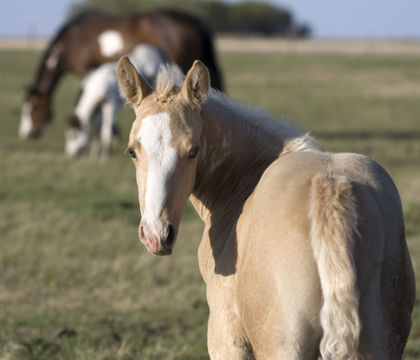
Emergency care for orphan foals: five tips
It's a position you hope you never need to be in — but if you suddenly become responsible for an orphan foal, here are five tips from Dr. Fernando J. Marqués, a specialist in large animal internal medicine at the WCVM, on what to expect.
By Christina Weese
1. Consult a veterinarian. "Because foals have no energy reserves in place," explains Marqués, "they can go downhill very fast compared to an adult horse. So it's important not to wait – at the first sign of trouble, call the vet." Owners should keep the foal warm and dry until it can be seen by a veterinarian or transported to a veterinary facility.
2. Is the foal healthy? "The foal will first be assessed to determine if it needs any treatment besides nutrition and fluids," says Marqués. There are a variety of situations, especially with a difficult or prolonged birth, that could have an impact on newborn foal's health. Your veterinarian will want to assess these needs so they can be addressed as soon as possible.

3. The race for antibodies. A newborn will need colostrum or plasma to provide them with the antibodies needed to fight viral and bacterial infections. "It's not uncommon for neonates to get infections within their first hours of life," says Marqués.
Colostrum must be given ideally within 12 hours of birth: after 24 hours the foal's intestinal lining will no longer absorb immunoglobulins (antibodies). Beyond 24 hours, or if colostrum is unavailable, blood plasma can be given intravenously.
If owners are unsure as to whether a foal received enough colostrum from its mother, veterinarians can run a blood test to check for the presence of antibodies in the foal's blood.
4. Nutritional needs. If the orphan foal is healthy, its primary need is mare's milk to provide nutrition and fluids. "Foals are fed 15 to 20 per cent of their body weight per day in milk," says Marqués, "and should be fed every two hours."
Overfeeding can be just as detrimental as underfeeding, so following recommendations to calculate the right amount of milk is very important. A number of commercial milk replacers made specifically for horses are available.
5. Be aware of normal foal behaviour. Having a baseline for normal expected foal behaviour can be extremely helpful. The lack of a normal bonding with the mare or the lack of a suckle reflex, which can be indicative of "dummy foal" syndrome or systemic infection (sepsis), is a big red flag.
"The suckle reflex is a neurologic reflex, an involuntary and almost instantaneous response," says Marqués. "It's like having your knee tapped with a hammer — it's not a learned behaviour. If you put your fingers in a foal's mouth and there's a weak suckle or none at all, this is indicative of further problems."
If the foal is unable to nurse, a veterinarian will need to determine why. Possible reasons include neurological damage or sepsis, and the foal will probably need intravenous fluids, antibiotics, etc. until it recovers enough to drink or nurse normally.
2. Is the foal healthy? "The foal will first be assessed to determine if it needs any treatment besides nutrition and fluids," says Marqués. There are a variety of situations, especially with a difficult or prolonged birth, that could have an impact on newborn foal's health. Your veterinarian will want to assess these needs so they can be addressed as soon as possible.

3. The race for antibodies. A newborn will need colostrum or plasma to provide them with the antibodies needed to fight viral and bacterial infections. "It's not uncommon for neonates to get infections within their first hours of life," says Marqués.
Colostrum must be given ideally within 12 hours of birth: after 24 hours the foal's intestinal lining will no longer absorb immunoglobulins (antibodies). Beyond 24 hours, or if colostrum is unavailable, blood plasma can be given intravenously.
If owners are unsure as to whether a foal received enough colostrum from its mother, veterinarians can run a blood test to check for the presence of antibodies in the foal's blood.
4. Nutritional needs. If the orphan foal is healthy, its primary need is mare's milk to provide nutrition and fluids. "Foals are fed 15 to 20 per cent of their body weight per day in milk," says Marqués, "and should be fed every two hours."
Overfeeding can be just as detrimental as underfeeding, so following recommendations to calculate the right amount of milk is very important. A number of commercial milk replacers made specifically for horses are available.
5. Be aware of normal foal behaviour. Having a baseline for normal expected foal behaviour can be extremely helpful. The lack of a normal bonding with the mare or the lack of a suckle reflex, which can be indicative of "dummy foal" syndrome or systemic infection (sepsis), is a big red flag.
"The suckle reflex is a neurologic reflex, an involuntary and almost instantaneous response," says Marqués. "It's like having your knee tapped with a hammer — it's not a learned behaviour. If you put your fingers in a foal's mouth and there's a weak suckle or none at all, this is indicative of further problems."
If the foal is unable to nurse, a veterinarian will need to determine why. Possible reasons include neurological damage or sepsis, and the foal will probably need intravenous fluids, antibiotics, etc. until it recovers enough to drink or nurse normally.
